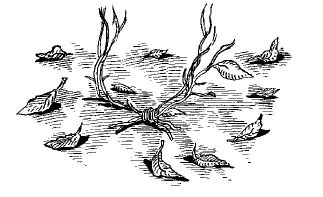The Book of Lost Books (7 page)


Euripides
{480â406 B.C.E.}
AT THE TIME of the battle of Salamis, Aeschylus was fighting, Sophocles was preparing to sing in the victory procession, and Euripides was being born, or so the legend goes. Most biographical details about the third member of classical Greek drama's mighty triumvirate have to be taken with a pinch of salt. Take, for example, the
Life and Race of Euripides
by one Satyrus. This work was thought to be lost, and our only traces of it were contained in commentaries, lexicons, and other authors, until a near-complete papyrus from Oxyrhynchus was pieced together in 1911. Until then, it would have been acceptable for any critic to quote these marginalia without too much worry about the source.
Among the tidbits we learn in the intact work, about Euripides' mother being a vegetable seller and about his often stormy relationship with his wife, we also learn that at one point the women of Athens became so frustrated with Euripides' supposedly misogynistic depiction of heroines that they convened a meeting to decide upon his punishment. Euripides persuaded his father-in-law, Mnelisochus, to attend the assembly, disguised as a woman, to learn what they were scheming. On the surface an amusing, if improbable, anecdote, until we remember that this is exactly the plot of Aristophanes' comedy the
Thesmophoriazusae.
The name “Satyrus” may well indicate we should not take the text too seriously.
Though Aristophanes put Euripides onstage at least twice, and peppered his own plays with parodic versions of
Melanippe the Wise,
Stheneboea, Oeneus,
and other plays now known only through their travesty, some writers thought the two men more similar than divergent. Cratinus slated an aspiring poet character in one of his plays as “a hair-splitting master of niceties, a regular Euripidaristophanist.” They moved in the same intellectual circles. Both Aristophanes and Euripides grew up during Athens' cultural and political heyday, and became opposed to its increasingly imperial policies as the war in the Peloponnese lingered and festered.
Aristophanes' criticisms of Euripides' plays exaggerate, but they do not invent. Euripides had shocked his audience by showing kings dressed as beggars, in the lost
Telephus,
for example. The
Bellerophon
had another ruler reduced to ignominious circumstances, andâwell, so says Aristophanesâscandalized the audience so much that every decent member swallowed poison immediately afterward. Sophocles said that he showed men as they ought to be, but Euripides showed them as they are. In the short term, this “realism” was no doubt considered a defect; in time, it becomes a virtue. Euripides also showed women, for the first time, as intelligent, vengeful, complex beings. His
Medea
still stuns, with the murderous foreigner rising like a goddess at the end, and no doubt, the
Daughters of Pelias, Cretan Women,
and
Alcmaeon in Psophis
would too, if they still existed. Most controversially, Euripides used the drama as a vehicle for philosophical speculation.
The young Euripides was taught by Anaxagoras, the adviser to Pericles and a natural scientist of intense perceptiveness; for example, he conjectured that the sun was not a god, but a mass of burning stone, “several times the size of the Peloponnesian peninsula,” and that the moon reflected light from the sun. Euripides was also well acquainted with the sophist Protagoras, who read his work
On the Gods
in Euripides' house. It opens: “About the Gods, I have no means of knowing whether they exist or not, since there are many obstacles to knowledge, the subject is obscure and man's life is short.” An echo of the sentiment can be heard in a line from Euripides'
Orestes:
“We are the slaves of the gods, whatever gods may be.” Both men were accused of impiety, and
On the Gods
was ordered to be burned, though the
Orestes
survived. Both ended their lives in exile from the increasingly intolerant Athens. According to Philodemus, when Euripides left Athens it was to the malicious celebrations of the citizens.
It is therefore ironic that more plays survive by Euripides than by Sophocles and Aeschylus put together: eighteen, including our only complete satyr play, out of over ninety. Even more surprising is the survival of plays that openly attack the Athenian policy. In the 430s and 420s, he wrote plays that honored the mythical founder of Athens, Theseus; nonetheless, the
Aegeus,
the
Theseus,
and the
Erechtheus
are all no more. In 420, Euripides wrote the Olympic Victory Ode for Alcibiades. At the time, Alcibiades was beginning to display the venality, vanity, and self-seeking impulses which would lead him to turn traitor, then return as a once-again victorious general. Beautiful, arrogant, beloved by Socrates, and riddled with contradiction, Alcibiades arranged for the Spartans to be banned from attending the games, in part to bolster his own chances of success.
Euripides' attitudes changed profoundly in 416 B.C.E., when Athens forcibly colonized the island of Melos. The city once hailed as the “Savior of Hellas” was now murdering the indigenous inhabitants of a minor island, and selling their women and children into slavery. When Euripides'
The Trojan Women
was staged, few could have been in doubt that it contained a political subtext, given that it showed a grandmother holding the corpse of a murdered grandchild, executed because he might one day, hypothetically, develop into a threat. In case we are in any doubt, the opening chorus rings out, “Such is the handiwork of Athena, daughter of Zeus.” The onetime propagandist of the state had become its implacable conscience. We have lost much of Euripides; though, on balance, it may be preferable to have lost his panegyrics and not his protest plays.
“Have all the nations of the world since his time created a dramatist worthy to hand him his slippers?” opined Goethe. Euripides was a patriot betrayed by his country, who combined traditional stories with the most advanced investigation into what it meant to be human and ethical. He was caricatured as a misanthropist, gynophobe, and blasphemer because he dared to look at the complexity of the world. Goethe's question applies as much to his person as to his art.

Agathon
{
c.
457â
c.
402 B.C.E.}
AT THE CLOSE of the fifth century B.C.E., King Archelaus of Macedonia was gradually realizing his ambitions to transform the northern Greek kingdom into something more substantial than a semibarbarous satellite state. He wished to form a nation that did not have to second-guess the strengths of Athens and Sparta and side with whichever seemed in the ascendant. Admittedly, he had had to murder his half-brother to gain the throne. Nonetheless, since the last decade of the century, an influx of exiles from Athens had greatly contributed to the ongoing program of civilization. His palace was decorated by the painter Zeuxis, whose trompe l'oeil were so convincing that birds reputedly attempted to snatch grapes that were no more than pigment on plaster. He listened to the intricate instrumental music of Timotheus, who had increased the number of strings on the cithara in order to turn his mental compositions into actual sounds.
As Athens became ever more militaristic, its much-vaunted intellectual freedoms became curtailed. Around 404 B.C.E., both Euripides and his friend and colleague in the theater Agathon decided that not only their finances, but their lives, were imperiled by Athens' drift into doctrinaire repression. They were rightâin 399 B.C.E., the philosopher Socrates, with whom they had both been intimate, was sentenced to death for corrupting the young. The court of King Archelaus must surely have appeared a relatively enlightened place to retire.
Agathon had suffered carping and derision from the Athenians. The comic playwright Aristophanes, whose wit notoriously spared neither friend nor foe, had lampooned his method of composition in the
Thesmophoriazusae.
Agathon had been presented dressed as a woman, justifying his odd vestments by saying that to write a female role, one had to think
as
a woman; and some moderate transvestism helped that process no end. Sly digs at his preference for homosexual over heterosexual relationships were accompanied by pastiches of his precious, ornate style.
Agathon's overrefined and rhetorically embellished poetry had been criticized often enough, and his retort to the critic who suggested excising those purpler passages had erred on the side of self-absorbed arrogance: “Would you purge Agathon of Agathon?” Other innovations introduced by him had been equally skeptically received. Aristotle, years later, would remember that “even Agathon” had been censured for trying to incorporate too much of an epic sweep into a single play. He had even severed the link between the Chorus and the action of the play, reducing their role to mere interludes.
Most contentiously, he had introduced an element into tragedy that had broken with every tradition: originality. His play
Antheus
(or
The
Flowers
) had been based on a plot of his own devising. It is hard to fully imagine the shock to the audience: instead of an Oedipus, whose incest and blinding would be fully expected, or a wounded Philoctetes, or a passion-struck Phaedra, there were characters whom nobody recognized. Nobody knew what was going to happen next, let alone at the end. The lost
Antheus
is the only original tragic plot we know of; later Greek authors returned to the well-worn myths.
All that said, Agathon had been successful. He had won the first prize in 416 B.C.E., and the celebration afterward would later be the setting for Plato's
Symposium.
Even in that imaginative reconstruction, lineaments of Agathon's character emerge. His lover, Pausanias, is present, and gives a defense of homosexual love affairs. Agathon's speech attests to his powers of invention and slightly florid tone. Although Phaedrus begins the debate by citing Hesiod and the lost author Acusilaus, who both maintain that Love is one of the oldest of the gods, Agathon begins by declaring conversely that Love is the youngest. He quotes the lost
Stheneboea
of Euripides, saying that love can turn men into poets, and argues with sophistication that since love is the strongest of passions, all other passions must be subordinate to it. Socrates gently unpicks the muddle of ingenuity.
As Agathon and Euripides, having finally decided to skip to Macedonia, headed toward the northern fastness of Archelaus, they may have discussed how best to write works that would flatter and challenge their new ruler. They may have compared notes on the veteran tragedian Sophocles, and his recent remarkable
Oedipus at Colonus.
What opportunities and advancements lay ahead? After all, they had already done enough to guarantee their immortality.
Put “Agathon” into an Internet search engine. Weed out the copious commentaries on Plato's
Symposium.
You will find a lot of information about precision tool manufacturing, with a special emphasis on ball sleeves, tool guiding, and plastic molding. There is a kennel club, a Webhosting service, and an academic publisher specializing in political science. There are details about a northern European rock band, Agathon's Favorite, who played in Liverpool once, and synopses of the 1975 movie
Assault on Agathon,
directed by Laslo Benedek (about a Greek Second World War veteran, thought dead, who returns to fight again). In January of the same year, Marvel Comics'
Haunt of Horror #5
featured Agathon the Tempter, a servant of Kudros, a.k.a. Satan, who was impaled on a spiked sculpture by Satan's daughter, Satana. Jonathan Edwards played Agathon in season three of
Xena, Warrior Princess,
where he is now a warlord with magic armor from Hephaestus, the god of metalworking.
The Wreckage of Agathon
(Harper and Row, 1970), by John Gardner, a philosophical satire, was compared by one Amazon reviewer to Borges.
There are no extant plays by Agathon.
Two fragments of Agathon's work were used by Aristotle to emphasize and illustrate his arguments. “Art loves Chance and Chance loves Art,” reads one, and chance has snatched any art Agathon was once thought to have had. “Not even the Gods can change the past,” reads the other: a fitting epitaph, perhaps, for all the lost books.